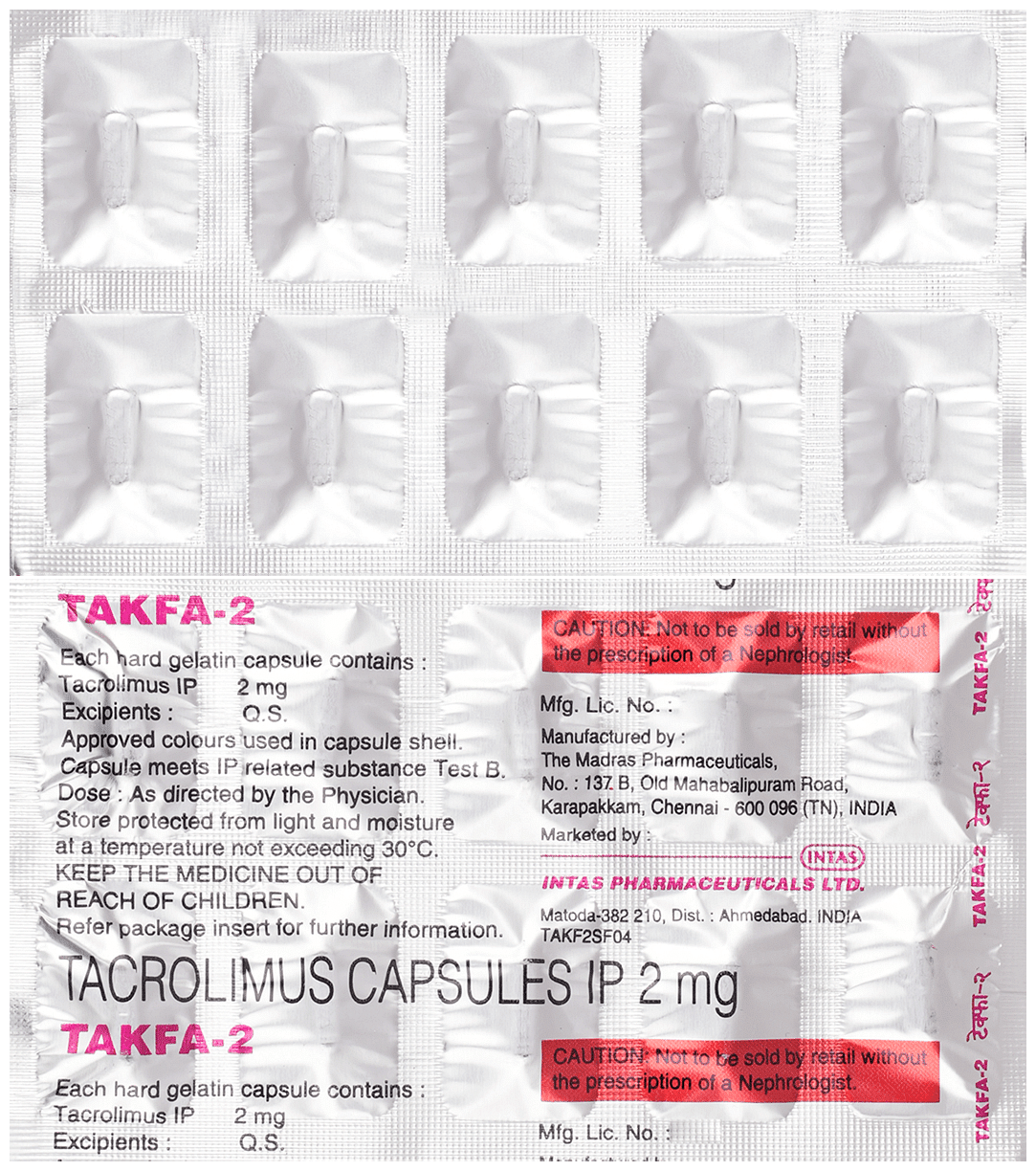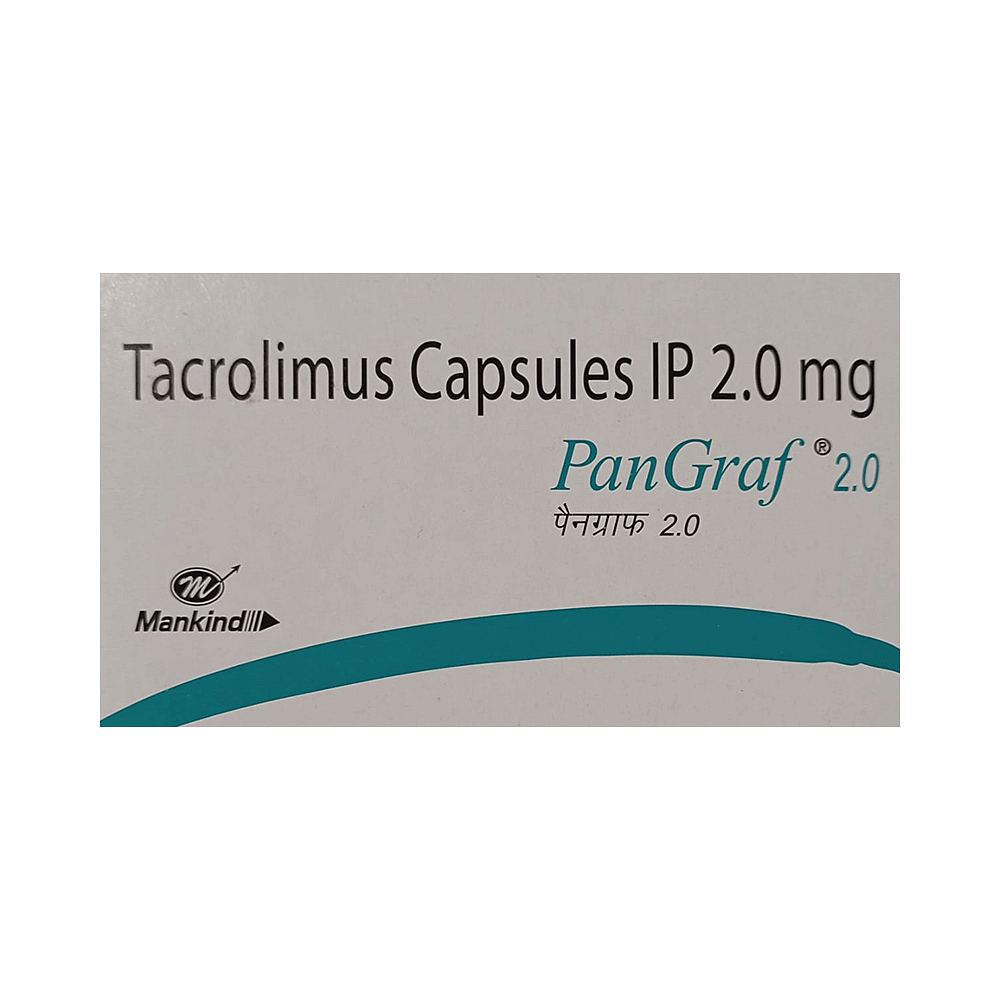
Keygraf 2 Capsule
Manufacturer
Anthem Biopharma
Salt Composition
Tacrolimus (2mg)
Key Information
Short Description
Keygraf 2 Capsule is used along with other medicines to prevent your body from rejecting a new organ after transplant by weakening your immune system.
Dosage Form
Capsule
Introduction
Keygraf 2 Capsule is an immunosuppressant medication used to prevent organ rejection in transplant patients. It works by weakening the body's immune system to prevent it from attacking the new organ. This medication is essential for patients who have undergone liver, kidney, or heart transplants. Regular monitoring of blood cells and kidney function is necessary while on this medication. It is important to follow the prescribed dosage and not to stop taking the medicine without consulting your doctor. Potential side effects and warnings should be discussed with a healthcare provider.
Directions for Use
Take this medicine in the dose and duration as advised by your doctor. Keygraf 2 Capsule is to be taken on an empty stomach.
How it works
Keygraf 2 Capsule is an immunosuppressant. It works by suppressing your body’s immune response following the transplant of an organ (e.g., liver, kidney, heart). This helps your body to accept the new organ as if it were your own.
Quick Tips
Keygraf 2 Capsule is used to prevent organ rejection in transplant patients. It may take 3 to 4 months for the medication to work. Keep taking it as prescribed. Your doctor may get regular blood tests done to check the levels of blood cells in your blood. Inform your doctor if you experience unexplained bruising or bleeding, sore throat, mouth ulcers, fever, or general illness. Your doctor may monitor your kidney function regularly. Drink 8 to 10 glasses of water per day to help with your kidney function. Do not stop taking Keygraf 2 Capsule without talking to your doctor first.
Related Medicines

Takfa 2 Capsule

Pangraf 2 Capsule

Tacronic 2mg Capsule

Tacva 2mg Capsule

Tacgov 2 Capsule

Tacrocord 2.0 Capsule

Tacrosan 2mg Capsule

Loprolif 2mg Capsule

Biomus 2mg Capsule

Citac 2mg Capsule
Frequently asked questions
Is Keygraf 2 Capsule an antibiotic?
Yes, Keygraf 2 Capsule is an antibiotic belonging to the macrolide group. It is primarily used after organ transplantation to suppress the immune system, which helps prevent organ rejection in cases of kidney, heart, or liver transplants.
Which vaccines should not be taken while taking Keygraf 2 Capsule?
You should avoid taking live vaccines (vaccines that contain weakened pathogens) while on Keygraf 2 Capsule. These include measles, mumps, rubella, BCG (TB vaccine), yellow fever, chicken pox and typhoid vaccines. You should also avoid polio drops or flu shot (nasal administration).
Who should not take Keygraf 2 Capsule?
Individuals with allergies to the medication or a weakened immune system, those with high blood pressure, and those with kidney failure should avoid Keygraf 2 Capsule. Additionally, pregnant and breastfeeding women, as well as individuals planning to receive live vaccines (e.g., MMR vaccine), should avoid this medication.
What should I tell my doctor before taking Keygraf 2 Capsule?
Before starting Keygraf 2 Capsule, inform your doctor about any potential allergies, long-term infections, high blood sugar or blood pressure, and if you have experienced a history of medication interactions, recent vaccination, or are scheduled to receive a live vaccine in the near future.
What should I be aware of before I start taking Keygraf 2 Capsule?
This medication suppresses the immune system. As such, there is an increased risk of infection. It may also increase cancer risk (like skin and lymph gland cancers) in some cases. You must consult your doctor before starting this medication and notify them immediately if you experience symptoms of infections like fever, chills, coughs or flu-like symptoms, muscle aches, warm, red, or painful areas on the skin.
Does Keygraf 2 Capsule have an abuse potential?
No, Keygraf 2 Capsule does not have abuse potential and is not a controlled substance. Controlled substances have the potential for abuse; therefore, they require authorization from authorities and doctors to ensure their proper use.


